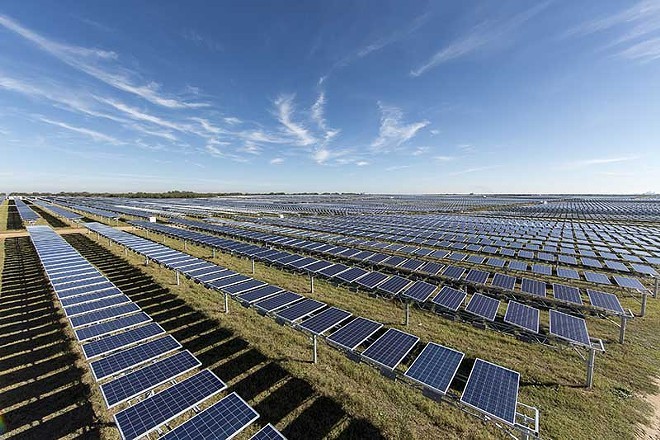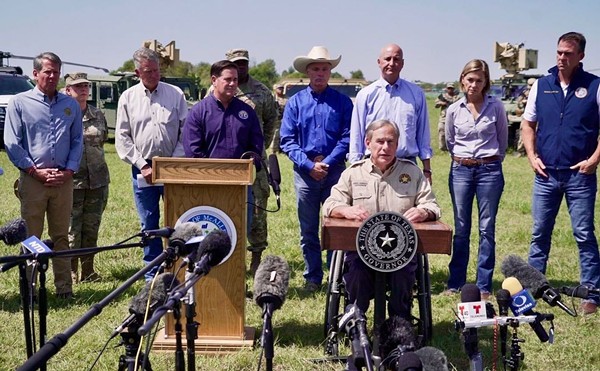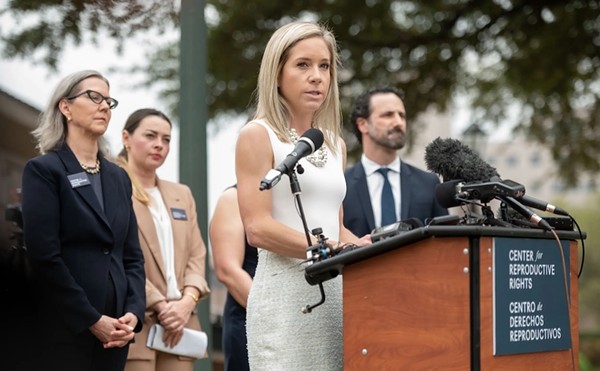
Editor's Note: Bad Takes is a column of opinion and analysis.
While climate activist Greta Thunberg was getting hauled off by German police last Wednesday to protest the expansion of a coal mine, San Antonio Mayor Ron Nirenberg was setting a far less inspiring example.
Back in the fall of 2019, at a CPS Energy Board of Trustees meeting, Nirenberg stated what seemed like his commitment to holding the city-owned utility to rely on renewables for future growth.
"I want any generation, any capacity that we add to CPS's portfolio, henceforth, to be renewable," Nirenberg said.
That makes his endorsement of Portfolio 2, a plan to extend the life of CPS's last remaining coal-fired power plant by converting it to natural gas, a clear-cut backslide on that commitment and a broken promise to the environmentally conscious San Antonians who twice elected him.
When the Current held Nirenberg's feet to the fire in 2017 for his seeming failure to stand with mayors across Texas and the nation in opposing President Donald Trump's withdrawal from the Paris Climate Agreement, Nirenberg called up my editor to clarify, stating, "I think we should be part of that."
True to his word, later that June, the newly seated mayor not only signed a resolution in support of the Mayors National Climate Action Agenda, but also championed San Antonio's Climate Action and Adaptation Plan (CAAP) to reach net-zero emissions by 2050.
CPS's Board of Trustees followed Nirenberg's lead in approving Portfolio 2 on Monday, doing so over the objections of the CAAP's own Technical and Community Advisory Committee, which passed a draft resolution recommending Portfolio 9, a more popular and more ambitious investment in solar and wind energy in lieu of both coal and natural gas.
You can watch last Tuesday's meeting in its entirety on the Office of Sustainability's Facebook page.
During that meeting, member at-large Ryan Weber, who has also served as climate manager at the World Resources Institute, a global research nonprofit funded by the MacArthur Foundation, concluded that "it's unlikely that Portfolio 2 achieves CAAP targets at all. I don't think I've seen any evidence of that."
University of Texas Health Science Center Professor Jimmy Perkins was even more adamant.
"Portfolio 2 should never have been considered in the first place," he said. "It runs the Spruce Power Plant until 2065. How can you meet a 2050 goal of net-zero emissions when you're burning gas until 2065?"
He added: "I don't know what they're going to do with the methane that leaks from the wells, but that to me is an automatic disqualifier."
While natural gas is a cleaner energy source than coal, it's certainly not free of harmful pollution.
"Coal is just about the dirtiest way to produce electricity, so almost anything will seem cleaner in comparison," Mark Specht, senior analyst for Western States Energy wrote for the Union of Concerned Scientists. But, crucially, "natural gas power plants still produce a significant amount of air pollution, and that's a problem."
Indeed, methane is a greenhouse gas 80 times more potent than carbon dioxide in terms of exacerbating warming temperatures, and it's the primary contributor to ground-level ozone, exposure to which causes an estimated one million premature deaths worldwide annually.
According to data from the United States National Oceanic and Atmospheric Administration, "even as carbon dioxide emissions decelerated during the pandemic-related lockdowns of 2020, atmospheric methane shot up."
The Rocky Mountain Institute, a nonpartisan organization dedicated to prudently transitioning away from fossil fuels, last year wrote that the benefits of moving to clean energy should outweigh those of investing in gas facilities.
"For communities that have been historically impacted by pollution, avoiding gas with clean energy can be an opportunity to both reduce electricity bills and future healthcare bills, which will make it increasingly difficult for utilities and investors to justify new gas investment."
Yet the economic consulting firm San Antonio relied on for its cost estimates, Charles River Associates (CRA), has a fraught history of rationalizing just such difficult-to-justify bygone fossil fuel investments. Benjamin Franta, senior researcher at the University of Oxford Sustainable Law Program, made a study of CRA and didn't mince words.
"Every time a major climate policy was proposed, these economists would be there, writing newspaper articles and giving testimony in front of Congress, from carbon tax conversations in the Clinton administration to opposing international treaties, like the Kyoto Protocol," he wrote.
Franta, in an interview with Grist magazine, all but called CRA a hired gun that provides ideological cover for delaying climate action. "They also worked to defeat the cap-and-trade bills that were proposed throughout the 2000s," he said.
Sadly, if Portfolio 2 passes as expected, most in San Antonio will neither have mulled over or discussed the options. Many may not even realize the decision has been made.
"[Live-streaming] the entire sausage-making process does not equal community inclusion," Greg Harman, the editor at online environmental journal Deceleration News said in a social media post.
Case in point, only one public comment arrived before the deadline at Tuesday's meeting of the Community Advisory Committee, and I counted seven real-time viewers at its peak.
Nationwide, cheaper clean energy portfolios could save tens of billions of dollars compared to offering the same services with gas-fired plants, and excuses based on the supposed resiliency of fossil fuels are farcical. The surest way to avoid self-inflicted disasters like the collapse of our electric grid two winters ago is to eschew the cowboy mentality of "going it alone" and hook up Texas' grid to those powering other states.
And lest industry-friendly pundits and politicians rewrite history, remember that it was solar and wind energy that not only mitigated the 2021 calamity but spared us massive blackouts when several plants buckled under the extreme heatwave last summer. While scientists race to achieve fusion, we should not forget that a gigantic fusion reactor is already up and running every day.
It's called the sun.
As for our flip-flopping mayor, Nirenberg is padding a resume of being a progressive in the tweets and a corporatist in the sheets.
"San Antonio is not going to abate homeless encampments just because we don't like the sight of them," the mayor told the Texas Tribune last May. "That's not what we do."
Well said. Except SAPD has abated homeless encampments repeatedly, displacing those living under Interstate 37 so the Texas Department of Transportation could lease the property out.
As long as San Antonio mayors exude wishy-washiness in the face of monied interests, they may ably pose as likable commercials for the city and edge out grievance candidates like Greg Brockhouse come Election Day.
But if we must turn to Swedish youth for unflinching leadership on the big challenges ahead, what hope do we have?
Follow us: Google News | NewsBreak | Instagram | Facebook | Twitter















